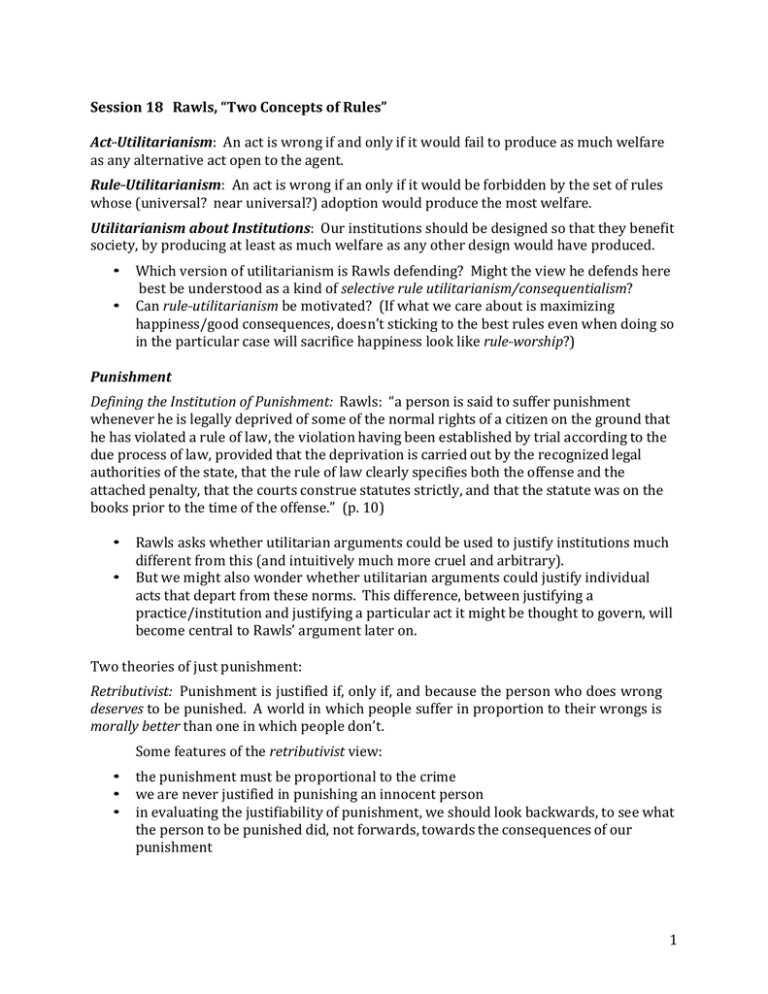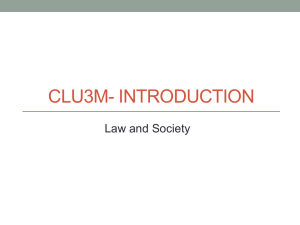as any alternative act open to the agent. Act--Utilitarianism
advertisement

Session 18 Rawls, “Two Concepts of Rules”
Act--Utilitarianism: An act is wrong if and only if it would fail to produce as much welfare
as any alternative act open to the agent.
Rule--Utilitarianism: An act is wrong if an only if it would be forbidden by the set of rules
whose (universal? near universal?) adoption would produce the most welfare.
Utilitarianism about Institutions: Our institutions should be designed so that they benefit
society, by producing at least as much welfare as any other design would have produced.
•
•
Which version of utilitarianism is Rawls defending? Might the view he defends here
best be understood as a kind of selective rule utilitarianism/consequentialism?
Can rule--utilitarianism be motivated? (If what we care about is maximizing
happiness/good consequences, doesn’t sticking to the best rules even when doing so
in the particular case will sacrifice happiness look like rule--worship?)
Punishment
Defining the Institution of Punishment: Rawls: “a person is said to suffer punishment
whenever he is legally deprived of some of the normal rights of a citizen on the ground that
he has violated a rule of law, the violation having been established by trial according to the
due process of law, provided that the deprivation is carried out by the recognized legal
authorities of the state, that the rule of law clearly specifies both the offense and the
attached penalty, that the courts construe statutes strictly, and that the statute was on the
books prior to the time of the offense.” (p. 10)
•
•
Rawls asks whether utilitarian arguments could be used to justify institutions much
different from this (and intuitively much more cruel and arbitrary).
But we might also wonder whether utilitarian arguments could justify individual
acts that depart from these norms. This difference, between justifying a
practice/institution and justifying a particular act it might be thought to govern, will
become central to Rawls’ argument later on.
Two theories of just punishment:
Retributivist: Punishment is justified if, only if, and because the person who does wrong
deserves to be punished. A world in which people suffer in proportion to their wrongs is
morally better than one in which people don’t.
Some features of the retributivist view:
•
•
•
the punishment must be proportional to the crime
we are never justified in punishing an innocent person
in evaluating the justifiability of punishment, we should look backwards, to see what
the person to be punished did, not forwards, towards the consequences of our
punishment
1
Utilitarian: Punishment is justified if, only if, and because punishing someone will lead to at
least as much welfare as not punishing. The severity of the punishment should be
determined by what level of punishment would have the best effects.
Some features of the utilitarian view:
•
•
because punishment causes (at least temporary) reduction in the welfare of the
person being punished, we should always choose the minimal punishment
necessary to achieving the good effects
in evaluating the justifiability of punishment, we should look forwards, towards the
consequences of our punishment, not backwards, to the crimes committed
An apparent problem for the utilitarian view:
•
Might it justify punishing an innocent person? (See Carritt’s example, p. 10)
o An inconsistent triad?
(i)
The state ought to act so as to maximize welfare.
(ii)
The state ought never to punish a person it knows to be innocent (or
release without punishment a person it knows to be guilty?).
(iii) Sometimes maximizing welfare will require the state to punish a
person it knows to be innocent (or release without punishment a
person it knows to be guilty).
o Which of these three propositions can we reject?
Rawls’ suggestion: The utilitarian approach to punishment is appropriate when
evaluating/justifying the institution or practice of punishment (these arguments should
influence the legislator); the retributivist approach is appropriate when
evaluating/justifying a particular decision within the practice (these arguments should
influence the judge). In other words, utilitarian arguments justify adopting a practice of
punishment that is governed by retributivist rules.
•
Question: Would utilitarian considerations lead us to adopt an institution of
punishment governed by retributivist rules? Would utilitarian considerations
definitely lead us to reject “telishment”? Would an institution of punishment
designed on the basis of utilitarian considerations look any different from the
retributivist model? (If they look the same, might they do so only contingently?)
o Will all and only those acts we may have good utilitarian reasons to
restrain/deter be those acts we think wrong and deserving of punishment?
- E.g., what if (as a contingent matter) a society reacts with “terror and
alarm” to acts which are (or would be, if the society did not react this
way) harmless? (E.g., homosexual behavior in a society significantly
more homophobic than ours…)
- What about acts which do spread terror and alarm and are harmful
but are not wrong (e.g., being the carrier of a contagious disease)?
o There may be ways in which the “proportionality” recommended by forward-­­
looking considerations of utility doesn’t match up with the “proportionality”
recommended by desert
2
We might need harsher punishments to deter high-­­profit, hard-­­to-­­
detect crimes, even if they seem less bad/blameworthy (e.g. tax
evasion v. murder).
- The benefits of incapacitating repeat offenders might justify long
prison terms for, e.g., chronic petty thieves, but a comparatively short
term for someone guilty of a one-­­off, very serious offense (e.g.,
patricide).
o But other considerations will tend to make the proportionality
recommended by considerations of utility match up with that recommended
by considerations of desert: as Bentham notes, the punishment cannot be
more costly than the crime (or it would be “too expensive”), and the system
of punishment should be designed so as to provide incentives to prefer the
less harmful crime to the more harmful.
o Does the wrongness of a crime – and the punishment it deserves – always
correlate with how harmful it is, or might be expected to be?
o Retribution may be built into the concept of punishment. If so, perhaps we
can’t ask whether it would make sense (from the utilitarian perspective) to
have a sytem of punishment that allows for punishing those who aren’t guilty
(but doesn’t our actual system do this?). But we can ask whether a utilitarian
would necessarily prefer a system of punishment to some other method of
crime-­­control.
-
•
Question: Would it be possible/appropriate to justify the institution of punishment
on purely retributivist grounds?
o The proportionality rule underdetermines the severity of punishment, and
“and eye for an eye” seems a bit barbaric.
o We don’t want to punish all wrong acts (at least not through the legal
system).
•
Rawls suggests that different roles for the utilitarian and retributivist justifications
for punishment can be brought out by considering the difference between two kinds
of questions:
(i)
Q: Why was J thrown in jail? (What justified throwing J in jail?)
A: He robbed a bank. (Backward-­­looking, retributivist justification)
Q: Why throw bank robbers in jail?
A: Doing so deters future crimes, and so is for the good of society. (Forward-­­
looking, utilitarian justification)
(ii)
Are these really two different kinds of questions, demanding two different kinds of
answers? Mightn’t we ask the first, even if we knew J robbed a bank?
{Promising
The problem for utilitarians: It seems like a utilitarian will have difficulty accounting for
our intuition that we are not justified in breaking a promise just because doing so will have
the best effects overall (even taking into account the negative effects on the practice of
promising), because the act-­­utilitarian principle, applied to individual decisions about
3
when to keep or break a promise, would tell us to break it when doing so would have the
best effects overall. (Consider the death-­­bed promise case.)
Rawls’ suggestion: utilitarian considerations should be appealed to to justify the practice of
promising, but the rules of a practice justified on utilitarian grounds would not include a
rule permitting us to break our promises when doing so would be best on the whole,
because such a practice would be much less useful than our actual practice. So utilitarian
considerations may not be appealed to to justify particular decisions falling under the
practice.
Again, compare two questions:
(iii)
(i)
Q:
A:
Q:
A:
Why did J do that? (Why should J do that?)
He promised he would. (Backward-­­looking)
Why do what you promised?
Because it leads to the best consequences. (Forward-­­looking)
But again, we might ask, are these really different kinds of questions, demanding
different kinds of answers?}
Practice Rules v. Summary Rules
Summary Rule: a “rule of thumb” or rule of convenience; it represents a kind of “summary”
of past decisions arrived at by direct application of more basic reasoning (e.g., the
utilitarian principle)
•
•
•
•
•
useful to us because similar cases tend to reoccur
decisions made on particular cases are logically prior to the rules: “the performance
of the action to which the rule refers does not require the stage-­­setting of a practice
of which this rule is a part”
in principle, we’re “always entitled to reconsider the correctness of a rule and to
question whether or not it is proper to follow it in a particular case (But: can a rule
of thumb serve a useful purpose if we can question it every time? Mightn’t we think, in
the case of summary rules, too, that we can only question whether it’s a rule we have
reason to adopt, not whether we should use it in this case?)
employing a summary rule is justified if and because applying it will lead us to be
more likely to make an independently correct decision then we would by direct
application of the more basic reasoning; but what the right thing to do is in this case
is independent of what the rule tells us… (Though again, perhaps the usefulness of
the rule changes our reasons – gives us reasons to follow it even in the case where it, in
a gods--view sense, leads us astray…)
Examples? Don’t tell a fatally ill person that he’s dying; Look both ways before you
cross the street…
Practice Rule: Rule setting up offices, or defining certain actions and specifying when they
are appropriate, establishing penalties, etc.
•
Rules of practice are logically prior to particular cases of actions governed by those
rules – e.g. striking out, stealing a base, making a promise, punishing: there is no
way to strike out without following the rules of baseball. (But what about cheating?
4
•
•
•
•
I can’t get out of criticism for breaking a rule by saying that, since I broke the rule, I
was in fact playing a different game and had no obligations defined by it…)
Someone who wants to perform an action governed by a practice rule can’t
meaningfully ask whether or not he should follow the rule in this case (consider
“can I have a fourth strike?” – such a person would be most charitably interpreted as
asking what the rules were – see discussion of baseball on pp. 25-­­26)
Questioning whether to follow a rule, Rawls suggests, must take the form of
questioning the rule itself – that is, questioning whether the practice is designed as
well as it might be (see footnote 25, pp. 28-­­9, for an example)
Defenses of particular actions falling under practices must take the form of appeals
to the rules of the practice, and then defenses of the practice as a whole. (Remember
our two questions…) Actions governed by practice rules aren’t correct
or incorrect independently of the place-­­setting of the practice. (But: can’t I respond
by saying, I know J robbed a bank, and I know there are good justifications for a
(general) practice of punishing bank robbers by imprisoning them, but ought we to
imprison J? After all, imprisoning J is an action that’s not defined by the practice, even
if punishment is…)
“One can be as radical as one likes but in the case of actions specified by practices
the objects of one’s radicalism must be the social practices and people’s acceptance
of them.” (p. 32)
Questions:
•
•
•
Are there important disanalogies between punishment and baseball?
o The role of the legislator and the role of the judge are less cleanly separated
in the case of punishment than the role of the designers of the game and of
the umpire in baseball.
- Consider the interpretive work that some legal theorists at least think
is the proper role of judges – might it be part of the proper role of
judges, in interpreting the law, to take account of some of the same
considerations that should move legislators when they frame the law?
(Remember Dworkin’s “policy” considerations…)
Is it never appropriate to ask whether a particular act mandated by a practice is
justified, if we’re agreed that the practice itself is justified?
o I might not be able to ask whether, say, a fourth strike is justified, but I can
ask whether my throwing the kid the ball again is justified…
o I may have good reason to step out of the office defined by the practice…
o It may make an important difference why I want to break the rules: consider
the difference between internal and external goals…
- It might sense to break the rules of baseball in order to have more fun
in a particular case (think of my birthday-­­kid), even if I think baseball
would not, in general, be more fun if it allowed 4 strikes in special
cases. But it wouldn’t make sense to break the rules of baseball in
order to “get a hit” – since that (internal) goal is one I can achieve only
by sticking to the rules of baseball.
What is cheating? E.g., what differentiates cross-­­checking from attacking someone
with a stick in ice-­­hockey?
5
MIT OpenCourseWare
http://ocw.mit.edu
24.235J / 17.021J Philosophy of Law
Spring 2012
For information about citing these materials or our Terms of Use, visit: http://ocw.mit.edu/terms.






